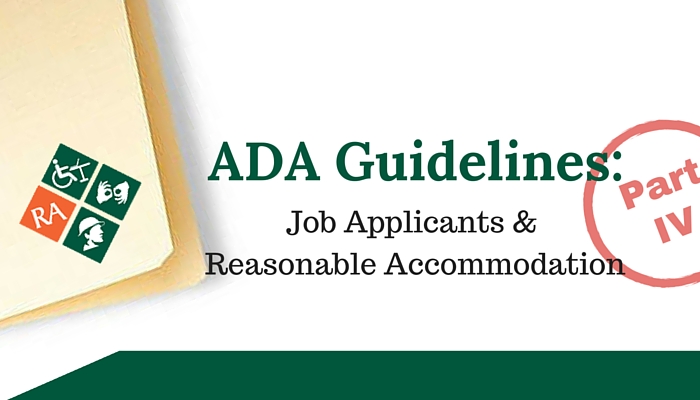I have an applicant for a janitorial job who has extensive spine injuries. He is requesting that the employer provide a back belt upon hire for wearing at work. There is NIOSH research that shows that back belts are not proven to help prevent back injuries. No other person in our facility wear back belts. Do we provide the requested item even though we do not think it will help…?????
In answering this original question in previous blogs, several other questions were raised that I would like to address:
“If there is a reason why you want to hire this individual over other applicants. If so, I am wondering why you don’t just send the applicant for a ‘POET’ test.”
Legality: the reason I would send this individual for a well-thought-out functional capacity evaluation of his safe ability to perform the lifting requirements of the essential functions is we are in that gray area where it is not legal to pick one individual to be tested out of a group of conditional hires but it is legal to refer for a medical examination secondary to safety concerns.
Referring to 42 U.S. Code Chapter 126 – EQUAL OPPORTUNITY FOR INDIVIDUALS WITH DISABILITIES – Sec. 12112. Discrimination – (d) Medical examinations and inquiries.
(3) Employment entrance examination. – A covered entity may require a medical examination after an offer of employment has been made to a job applicant and prior to the commencement of the employment duties of such applicant, and may condition an offer of employment on the results of such examination, if-
- all entering employees are subjected to such an examination regardless of disability;
Safety: drawing on my more than 25 years in the FCE/Post-Offer arena, I know that in most cases a POET is going to be less sensitive to his safety than a longer evaluation performed by a seasoned evaluator. By referring the evaluation to an evaluator who meets the requirements of Federal Rule of Evidence 702 (meaning a well-seasoned evaluator) I have anticipated challenges to both the reason for the evaluation (safety: business-related) and specificity (job-related).
Paul James v. Goodyear Tire and Rubber sets the parameters of a legal test;Indergard v. Georgia-Pacific reminds us of the need to be sure we are both of business necessity and are testing job-relatedness. Because I am working in a gray area here (also refer to the comment below received from another reader) I am preparing in advance to respond to a Request for Information from an EEOC investigator.
“If you are serious about hiring him, and he passes the exam, get him a belt. While you are at it, why not make belts available to all such personnel.”
The problem is that we already have expert opinion that a back belt does not prevent injury. In this case we have an individual with a history of spinal injury. To address my issues of concern about supporting my viewpoint about the unlikely success of the back belt I would turn to outside experts for their opinion and support. In the earlier blog we referred to the research done by ergonomic experts for our position on the back belt; I would also turn to Ask Jan (www.askjan.org) for further support.
Here is input from another LinkedIn member responding to the blog series:
While I agree with your overall approach and advice within the scope of this particular applicant I will say that instructing a healthcare professional not to utilize certain types of testing can be presumptive and cause possible issues later on if the applicant or legal counsel decides to take issue with your company’s testing process. So many pitfalls in the ADA language, and many different interpretations. Good example overall in my opinion.
Thanks for you input! My major concern for the candidates and workers I refer for a medical examination draws on my more than 25 years of experience in the FCE/Post-Offer arena. I follow the Practice Hierarchy from that field that stresses:
Safety
Reliability
Validity
Practicality
Utility
As I mentioned in the previous section of this blog, in most cases, a POET is going to be less sensitive to my worker’s safety than a longer evaluation performed by a seasoned evaluator. Given that this is a worker who has self-identified a series of back injuries, I don’t want an evaluator who is thinly trained or who robotically follows a protocol handed down from afar. I want a thinking evaluator. Believe me, I have toured clinics where they would not treat this worker any differently than a well-conditioned athlete with a history clear of spinal issues.
By referring the evaluation to an evaluator who meets the requirements of Federal Rule of Evidence 702 (meaning a well-seasoned evaluator) I have anticipated challenges to both the reason for the evaluation (safety: business-related) and specificity (job-related).
-Roy
To read more on this topic-
ADA Guidelines Job Applicants & Reasonable Accommodation Part I
ADA Guidelines Job Applicants & Reasonable Accommodation Part II
ADA Guidelines Job Applicants & Reasonable Accommodation Part III
Interested in learning even more about using Title I of the ADA to support your employees?



